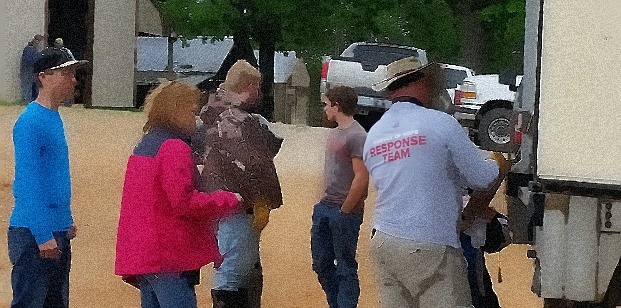Helping with Disaster Recovery in the Southern Ozarks, part 2
I usually report about nonprofit activity from the sidelines, but earlier this month massive flooding hit the area where I live. Over a period of 2 weeks, I experienced what it is like to live in a community affected by out-of-control weather. Due to the efforts of compassionate and resourceful people in my community, a relief effort began immediately. I was fortunate to experience only minor direct effects from the flooding and so was free to volunteer. Now, three weeks later, I've learned many precious lessons about the blessings offered by rolling up your sleeves to volunteer where you can. I know that many of our FundRaiser customers are the front line in making this possible for people all over the world. Here are some key experiences things I learned that I'm grateful for:
- Volunteering offered me a way to direct myself towards love and compassion instead of fear and sadness
- The coordinated relief effort depended on individuals who acted quickly and effectively
- This sort of rapid response seemed to happen overnight, but it was built on a foundation laid over many years
Volunteering offered me a way to direct myself towards love and compassion instead of fear and sadness
The flood brought with it feelings of fear and shock as the people and places I love were endangered and damaged. Reaching out to help focused me on love and connection and minimized my sense of powerlessness in the face of the raging water. During the flood itself, I focused on personally checking on friends and neighbors. After the water began to recede and I knew my own immediate circle was safe, I was left with a surreal feeling of knowing that many people were still suffering. When I heard that a local relief station had been set up to distribute emergency supplies, volunteering there gave me a way to handle those feelings.
The coordinated relief effort depended on individuals who acted quickly and effectively
This is the first time I've worked so directly with the first-response to an emergency and I was deeply impressed by the rapid response of the community. Many members whose own houses had been flooded focused on the larger problem, not on their single situation. They contacted relief services to get things up and running immediately. They understood that many people in the county had ruined houses or ones that were unlivable for now and that something effective needed to happen in a few hours. In many parts of the county, people were without electricity, phone and many with very limited transportation-- flooded cars and ruined roads. Even many cell towers were down.
I later learned that one woman, flooded out of her house and staying with family, got on the phone and internet and began contacting relief organizations, churches, businesses, and nonprofit agencies. She knew how to do this because she worked for a community action center and was inspired to put those skills to work.
Another woman whose house was flooded, put her skills as a marketing communications consultant to work and set up online communications to keep the relief effort running smoothly. Working with other community organizations she quickly made 'donate now' buttons public; made it simple to share information on where and how volunteers were needed; and more. In between, she handled the work of cleaning out her own house and office.
As a result of the efforts of these people and others, within a short span of time, shelters were set up, people were making and delivering thousands of hot meals up and down the river; and free food, clothes, hygiene products, and cleaning supplies were available for pick up at the local fairgrounds.
This sort of rapid response seemed to happen overnight, but it was built on a foundation laid over many years
Key people set the relief efforts into motion, but all sorts of people both inside and outside the community worked together to create success. Without the infrastructure in place from many organizations, the impact would have been much smaller. From my work at FundRaiser I know the devotion that many organizations have given to being able to effectively respond when emergency strikes. I had the opportunity to experience this first hand, along with the deep gratitude that comes from knowing that others are there when you need them.
I only saw a portion of the coordinated support our community received, and I know that there was much more I'm not aware of. What I did see was how local faith-based organizations provided invaluable infrastructure-- for volunteers, communications, and courage. Also, the important role that the Red Cross played. Other national nonprofits like Convoy of Hope and Billy Graham Ministries sent in truck after truck, and assured us that the trucks would continue to come as long as we needed them. Operation BBQ Relief set up in a short time and kept thousands of hot meals coming. Boxes from auxiliary church groups arrived rapidly with personal hygiene kits, baby supplies, nutritious food, and more. The philanthropic arm of large businesses contributed powerful cleaning supplies and tools to begin digging mud and gravel out of homes and stop the water damage from progressing. The Small Business Association quickly sent representatives to talk about emergency business loans, and more.
As I write this, first-response is transitioning into long-term recovery. I am looking forward to continuing to learn-by-experience about helping our community to recover. I am also grateful that through my job at FundRaiser I can continue to provide support to organizations involved with the kind of care our community received.
Please contact us if we can help you in any way to achieve your goals using FundRaiser, at 800-543-4131 or This email address is being protected from spambots. You need JavaScript enabled to view it.
